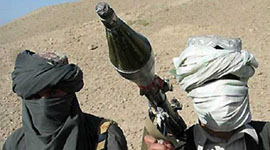
 The Pakistan government and Islamic hardliners on Monday signed an agreement to enforce Sharia law in the northwestern Swat valley, a
The Pakistan government and Islamic hardliners on Monday signed an agreement to enforce Sharia law in the northwestern Swat valley, a provincial minister told reporters.
Militants in the Swat Valley declared a 10-day ceasefire as a goodwill gesture ahead of the expected formal announcement of the agreement on Monday.
Several past deals with militants have failed, but Pakistan says force alone cannot defeat al-Qaida and Taliban fighters wreaking havoc in its northwest and attacking US troops in neighbouring Afghanistan.
The United States has said the deals merely give insurgents time to regroup.
Regaining the Swat Valley from militants is a major test for Pakistan’s shaky civilian leadership. Unlike the semiautonomous tribal regions where al-Qaida and Taliban have long thrived, the former tourist haven is supposed to be under full government control.
But militants have gained power since a peace deal last year collapsed within months, and violence has increased.
Provincial government leaders confirmed they were talking to a pro-Taliban group about ways to impose Islamic judicial practices in the Malakand division, which includes Swat.
The Swat Taliban’s version of Islamic law is especially harsh. They have declared a ban on female education, forced women to stay mostly indoors and clamped down on many forms of entertainment.
Taliban spokesman Muslim Khan said the militants would adhere to any deal reached with the group if Islamic law is implemented in the region.
He also announced the 10-day ceasefire. "We reserve the right to retaliate if we are fired upon," he said. "Once Islamic law is imposed, there will be no problems in Swat. The Taliban will lay down their arms."
Khan also said the militants had freed a Chinese engineer held captive for nearly six months. Long Xiaowei was freed on Saturday, days before a planned visit to China by Pakistani President Asif Ali Zardari.
Provincial law minister Arshad Abdullah said the deal would require the pro-Taliban group to convince the militants to first give up violence. Then existing laws governing the justice system can be amended or enforced, he said.
"They have to succumb to law," Abdullah said. "They have to put down their arms."
Past deals required militants to stop fighting but eventually unravelled amid militant complaints that the government was not meeting their demands.
The pro-Taliban group – known as the Tehrik Nifaz-e-Shariat Mohammedi, or the Movement for the Enforcement of Islamic Law – is led by Sufi Muhammad, who Pakistan freed from custody last year after he renounced violence.
Muhammad is the father-in-law of Maulana Fazlullah, the leader of the Swat Taliban. Muhammad, who has long agitated for Islamic law in the region, said that after the formal announcement he will go to Swat and ask Fazlullah and his men to lay down their arms.
A broad peace deal reached last year with Fazlullah’s militants effectively collapsed within a few months, and Pakistani security officials blame that agreement for the militants’ gains in Swat since then. The deal was supposed to let religious scholars advise judges in the courts, but the agreement encountered obstacles, said Mian Iftikhar Hussain, information minister for North West Frontier Province.
An Islamic judicial system is a concession to the insurgents, but it is also a long-standing demand of many civilians in the conservative region who are dissatisfied with the inefficient secular justice system.
Hussain noted that the Swat Taliban had responded well to the talks, but he warned that if "someone does not agree and does not adopt the way of dialogue, the government would be compelled to use force to establish its authority."
Pakistan has tried to avoid negotiating directly with militants, often using tribal elders as intermediaries.
Pakistan foreign minister Shah Mahmood Qureshi deflected concerns about a negative US reaction to the talks, insisting the country was reaching out to peaceful groups.
"We are not compromising with militants, instead trying to isolate the militants, and for that I do not think America will have any objection," he said.
Deteriorating security in the nuclear-armed country has included a string of attacks on foreigners.
UN officials said on Sunday they were still trying to establish contact with the kidnappers of an American employee seized Feb. 2 in the southwest city of Quetta. On Friday, John Solecki’s kidnappers threatened to kill him within 72 hours and issued a 20-second video of the blindfolded captive.
It was unclear exactly when the deadline would expire, and UN officials said Sunday they were still trying to establish contact with the kidnappers, who identify themselves as the previously unknown Baluchistan Liberation United Front. The name indicates the group is more likely linked to separatists than to Islamists.

Be the first to comment